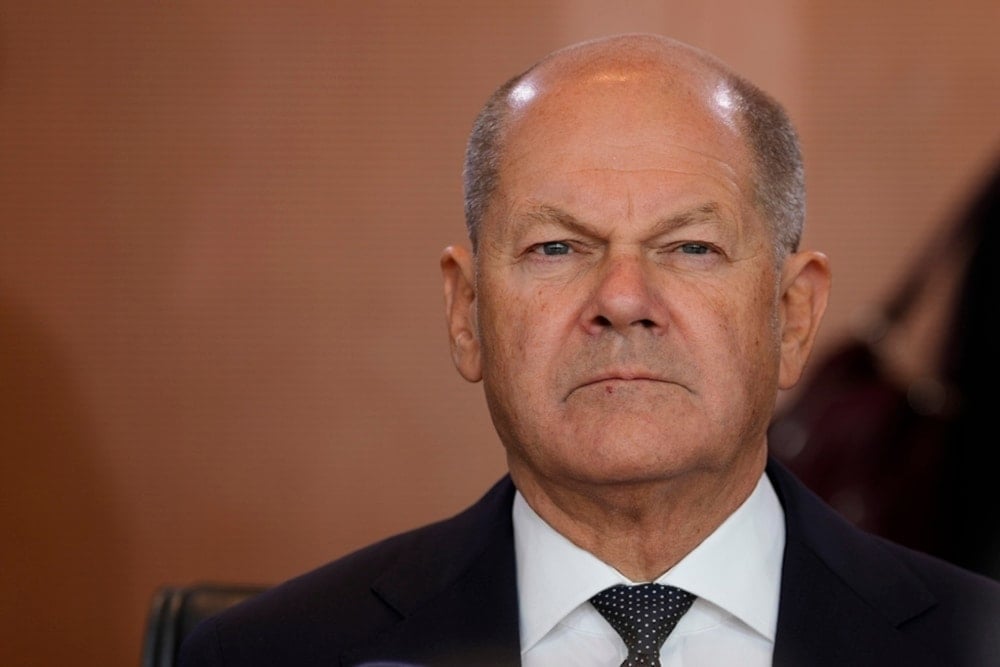Germany faces uncertainty as Scholz's ruling coalition collapses
German Chancellor Olaf Scholz has called for a confidence vote by January 15, allowing lawmakers to decide whether to call early elections.
-

German Chancellor Olaf Scholz arrives for the cabinet meeting of the government at the chancellery in Berlin, Germany, Wednesday, Oct. 9, 2024. (AP)
Germany has entered a period of political uncertainty following the collapse of its fragile three-party ruling coalition on the same day as Donald Trump's US election win.
Chancellor Olaf Scholz, who announced a confidence vote in January, with potential snap elections in March, will seek to reassure European allies at a summit in Budapest.
Scholz said late Wednesday that he plans to reach out to conservative opposition leader Friedrich Merz, who is currently leading in the polls, for support in passing key legislation on the economy and defense.
The collapse of his coalition, which robs him of a governing majority, comes at a critical moment for Germany's economy, projected to shrink for the second consecutive year.
Berenberg bank analyst Holger Schmieding wrote, "The early end of the coalition leaves Germany somewhat rudderless in what could be an exceptionally turbulent time right after Donald Trump won the U.S. election." However, Schmieding suggested that snap elections and fresh leadership in early 2025 could be beneficial, noting that "the constant bickering within the now-defunct three-party coalition had turned into a major obstacle to growth."
The big picture
Scholz is set to attend an EU summit in Budapest on Thursday to address global crises, including the war in Ukraine and the war on Gaza and Lebanon, both reportedly influenced by the US leadership transition. EU leaders are gathering for talks hosted by Hungarian Prime Minister Viktor Orban, a Trump supporter and vocal skeptic of aid to Kiev.
After months of internal discord, the coalition of Scholz's Social Democrats (SPD), the Greens, and the business-friendly Free Democrats (FDP) disintegrated on Wednesday night. Simultaneously, Scholz dismissed his contentious finance minister, Christian Lindner, effectively ejecting the FDP from the coalition and leaving the SPD and Greens to govern in a fragile minority.
Scholz has called for a confidence vote by January 15, allowing lawmakers to decide whether to call early elections, which could take place six months ahead of the previously scheduled September vote. Until then, the minority government will need opposition support to pass laws on a case-by-case basis.
Usually reserved, Scholz had harsh words for Lindner on Wednesday, saying that the "basis of trust" between them no longer existed. He accused the finance minister of "petty political tactics" and an egoism that was "completely incomprehensible".
Dive deeper
The FDP, the smallest party in the coalition, had long been at odds with the SPD and Greens on various issues, particularly over the budget and efforts to revitalize the struggling German economy. Lindner had frequently hinted at leaving the troubled coalition and had warned of "an autumn of decisions" as a key deadline for fiscal negotiations approached.
Scholz stressed the need for "clarity on how we can soundly finance our security and defense in the coming years without jeopardizing the cohesion of the country," adding that this was "perhaps more urgent than ever" given the US election outcome.
Scholz also revealed that he had proposed a plan to Lindner aimed at reducing energy costs, boosting investment in German businesses, protecting jobs in the auto industry, and maintaining support for Ukraine. However, Lindner, a staunch advocate of fiscal restraint and opposed to taking on new debt, showed "no willingness" to cooperate. Scholz concluded, "I no longer want to subject our country to such behavior."
It is worth noting that the collapse of the coalition drew sharp criticism from Friedrich Merz, leader of the opposition CDU-CSU alliance, who has long called for early elections. CDU lawmaker Norbert Roettgen said, "We cannot afford to argue for another year," after Trump’s victory and just before the coalition's breakdown.
Read next: EU elections see far-right advance in key France, Germany

 4 Min Read
4 Min Read








